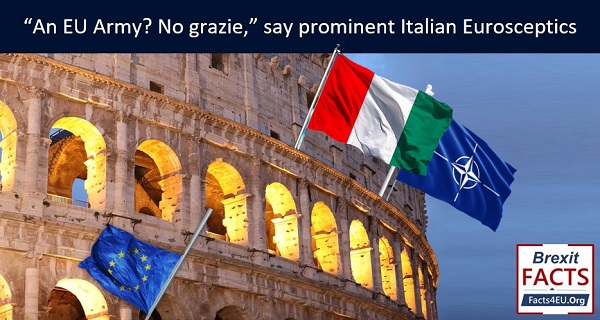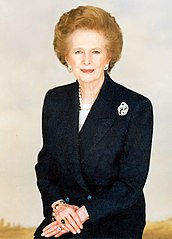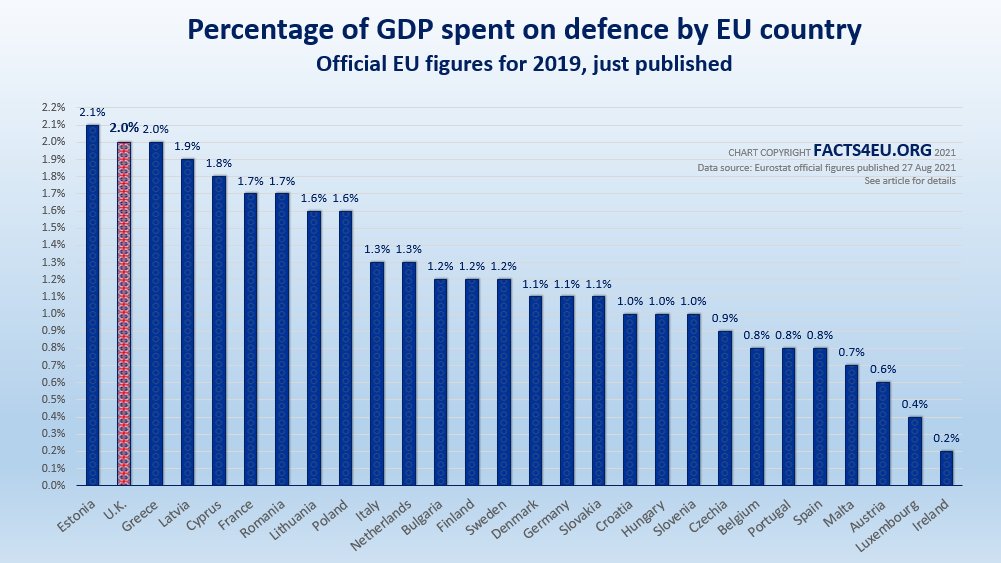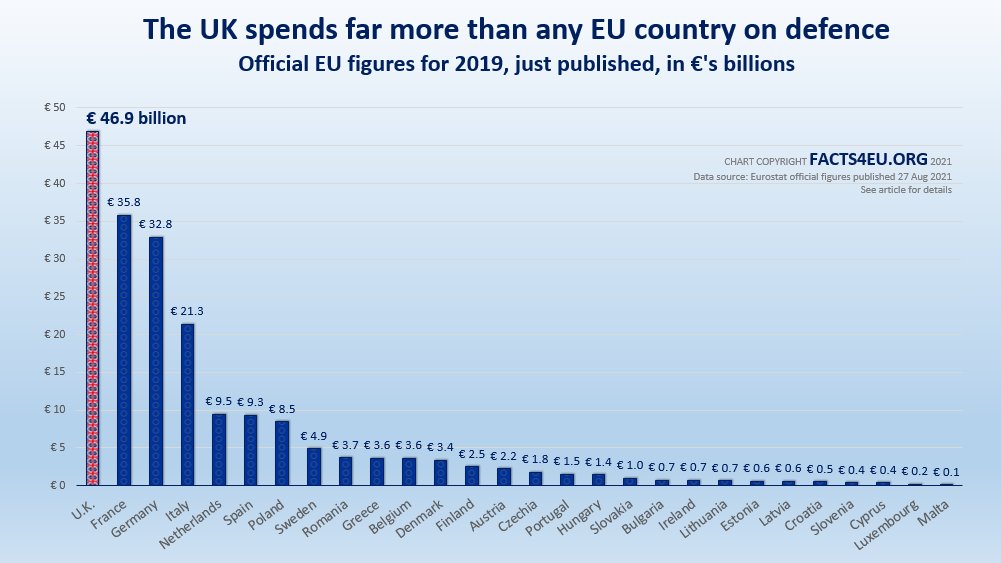“An EU Army? No grazie,” say prominent Italian Eurosceptics
European defence organised by the EU is “pie in the sky”

Montage © Facts4EU.Org 2021
EXCLUSIVE: An Italian vista from Rome – a guest article for Facts4EU.Org readers
Facts4EU.Org is pleased to present a rare treat for readers: a guest article from Rome, representing the views of two prominent Eurosceptic (and pro-Brexit) Italian political and economic commentators.
Bepi Pezzulli is Editor-in-Chief of La Voce Repubblicana, the official journal of Republican Party of Italy. He is also Editor-in-Chief of Italia Atlantica. Stefano Magni is a journalist and essayist. He is an associate professor of Economic Geography at the Faculty of Law, University of Milan.
In their first article for Facts4EU.Org they focus on the way in which the EU is using the Afghanistan crisis to re-ignite its dreams to become a world military power. Their conclusions are stark and are unlikely to be appreciated in Brussels.

“An EU Army? No grazie.”
By Bepi Pezzulli & Stefano Magni
After the rushed troop withdrawal from Afghanistan imposed by U.S. President Joe Biden upon the NATO coalition forces, the debate on the common European army is back on air. European defence is by no means a new issue; it creeps back with every international crisis.

Above: Stefano Magni
Photo left: Bepi Pezzulli
Before the retreat from Afghanistan…
Prior to the mission in Afghanistan, it had been voiced with some persistence vis-à-vis the Trump administration. When the White House expressed frustration towards the insufficient contribution of Europe to the NATO budget, French President Emmanuel Macron replied that NATO was brain-dead. Before Mr. Trump stirred up the waters, it had been raised in 2007 when the EU formed a battalion-sized rapid reaction force, never since deployed. And before that, in 2004, in the aftermath of operation Iraqi Freedom, when the EU created the European Defence Agency. A year before, the EU had embarked on its first independent military campaign in Congo, with the endorsement of the UN. Whenever a U.S. administration shows resolve to prioritise its national interests or calls for budgetary liability for NATO's membership, Europe blows the trumpet of strategic autonomy.
The idea of an EU army has a surreal quality to it
The whole idea is surreal, though. The main proponents of a common European army are the countries that contribute the least to defence spending. The only EU countries that allocate more than 2% of their GDP to the military budget are Estonia and Greece, which are both openly opposed to a common European army. The reason is that, defence costs, without U.S. backing, would prove astronomical and cut into welfare spending.
The EU was built to keep the continent in peace, not to make war. Its ethos is proven on the ground. Europe sent fewer troops into Afghanistan than the U.S. and the U.K.. While the latter two carried out most of the combat missions against Al Qaeda and the Taliban, the former performed training and nation-building tasks. The U.S. suffered 2,443 casualties (plus the 13 killed in the attack on 26 August at the Kabul airport), the U.K. 456, and all the other European allies combined 541 (53 Italians).
Increased defence spending may be hard to attain in the EU. By and large, EU continues to house anti-militarist public opinions and these result in continuing votes for anti-militarist parties.
In Italy, the radical left and the League Party (‘La Liga’) oppose international military campaigns. In 2015, at the height of the Isis terror campaign, Prime Minister Matteo Renzi famously stated that Europe should fight terrorism with culture. Italy's largest party, the 5 Star Movement has consistently voted down the purchase of the F-35 joint-strike fighters. In Germany, the SPD, the CDU and the Green Party, are against the rearm of Germany and pursue Swiss-style neutrality. It is precisely the delegation of German defence to NATO that has led the Biden Administration to accept the Northstream2 pipeline linking Germany to Russia.
The EU is too divided for it to conquer
The problem is that Europe does not have a common strategic priority. The northern EU countries are insensitive to the security of the Mediterranean and the Middle East. The eastern EU countries lament southern and western Europe's engagement with Russia. Poland seeks the support of American and British troops against the Russian threat but is loath to seek Germany's help: the memory of the invasion still weighs heavy today. France is not geared to defend the eastern flank in general. Italy would not fight in Africa to protect France's regional interests: In Libya, Rome and Paris stood on the opposite sides of the fence.
So far, European defence has been able to function within NATO, as long as the strategic priorities have been set by the U.S. In the event of a European defence, independent of NATO, old frictions and conflicting strategies are bound to resurface.
The Iron Lady was right: EU-led defence is a pipe dream
Margaret Thatcher was right all along. On 20 September 1988, she delivered her seminal Bruges speech:
“We should develop the Western European Union, not as an alternative to NATO, but as a means of strengthening Europe's contribution to the common defence of the West.
“Above all, at a time of change and uncertainly in the Soviet Union and Eastern Europe, we must preserve Europe's unity and resolve so that whatever may happen, our defence is sure.”
- Lady Thatcher, Bruges, 20 Sep 1988

In 1999, in the aftermath of the Kosovo war, when British Prime Minister Tony Blair did not oppose a common European defence in principle, Lady Thatcher warned the American public in a speech in New York:
"Superficially, it sounds splendid that the Europeans are now willing to concern themselves more with the continent’s defence. However, the real drive towards a separate European defence is the same as that towards a single European currency - namely the utopian venture of creating a single European super-state to rival America on the world stage."
And back in 2002, when the issue resurfaced after 9/11, the Iron Lady again expressed her misgivings about the project, saying that it was more political than military, and that it would ultimately damage the cohesion of the alliance with the United States. Lady Thatcher did not mince her words:
"If the Europeans really wanted to increase their contributions to NATO, they could prove it now. They can increase military spending. They can rapidly transform their armies into professional corps, like the United Kingdom's. And they can acquire more advanced technology." But: "I don't think the aim is to share the same field with the U.S., but to compete with them. And that is the real purpose of European defence plans and the UK should never be part of it."
European Union defence is pie in the sky
Lady Thatcher closed the case two decades ago. From a military point of view, European defence is a pipe dream. From a political point of view, it serves to separate Europe from its allies across the Atlantic and across the Channel.
As the threats of the XXIth century loom large, European Union defence is pie in the sky. It goes against the grain and endangers Trans-Atlantic security.
- By Bepi Pezzulli and Stefano Magni
© Bepi Pezzulli, Stefano Magni, and Facts4EU.Org 2021. Permission to reprint will be given free but must be requested first here.
Bepi Pezzulli is Editor-in-Chief of La Voce Repubblicana, the official journal of Republican Party of Italy. He is also Editor-in-Chief of Italia Atlantica, a conservative think-tank devoted to the principles of individual liberty, limited government, devolution of powers, free markets, fair international trade, and the defence of democracies. An Italian-British business lawyer, corporate executive, and geo-political strategist, he is an expert in capital markets, investment management and M&A and is the Global Britain watcher for Milano Finanza and Class-CNBC. On the subject, he authored 'An alternative view of Brexit' (2018) and 'The choice to stay at the periphery of Europe to gain more centrality in the world. Brexit is both radical and conservative' (2019). His research interest is economic statecraft.
Stefano Magni is is a journalist and essayist. For the Bruno Leoni Institute he edited the book "La signora non torna indietro. I grandi discorsi di Margaret Thatcher" (Ibl Libri, Milan, 2013).
He is an associate professor of Economic Geography at the Faculty of Law, University of Milan.
Observations
Not everyone in the EU believes in the 'EU Projekt'
Not every citizen of the EU is enamoured of the direction the EU is taking, as shown by the article above. Facts4EU.Org is grateful to Bepi Pezzulli and Stefano Magni for taking their time to give British readers a different perspective from the beautiful country of Italy.
With Afghanistan in the news on a daily basis, it is hardly surprising that the EU Commission has jumped on the opportunity to promote a further expansion of the EU's military ambitions. Taking a geo-political and historical stance, Signori Pezzulli and Magni have presented a fascinating counterpoint to the Commission's relentless moves towards a superstate, in terms of becoming a military power. We hope readers found it interesting.
Facts4EU.Org needs you today
We are a 'not for profit' team (we make a loss) and any donation goes towards the actual work, not plush London offices, lunch or taxi expenses, or other luxuries of some organisations.
We badly need more of our thousands of readers to donate. Could this be you, today? Maybe you've been thinking about it, but just haven't got around to doing it? If so, let us reassure you. It's quick and easy and we use two highly secure payment providers. And we do NOT ask you for further donations if you donate once - we just hope that you keep supporting us. Your donation stays anonymous unless you tell us otherwise.
Please don't assume that other people will keep us going - we don't receive enough to survive and we need your help today. Could you help us?
Most of our readers are well-informed and appreciate our fact-based articles, presented in a way you won't see anywhere else. If you value reports like the one above, please help our work with a donation. We have far more to do in researching, publishing, campaigning and lobbying Parliament than we have in terms of the financial resources to fulfil these tasks. We badly need funding to continue - we rely 100% on public donations from readers like you.
If you believe in a fully-free, independent, and sovereign United Kingdom, please make a donation now. It’s quick, secure, and confidential, and you can use one of the links below or you can use our Donations page here. You will receive a personal, friendly ‘thank you’ from a member of our team within 24 hours. Thank you for reading this.
[ Sources: Bepi Pezzulli & Stefano Magni ] Politicians and journalists can contact us for details, as ever.
Brexit Facts4EU.Org, Tues 07 Sep 2021
Click here to go to our news headlines
Please scroll down to COMMENT on the above article.
And don't forget to actually post your message after you have previewed it!
Since before the EU Referendum, Brexit Facts4EU.Org
has been the most prolific researcher and publisher of Brexit facts in the world.
Supported by MPs, MEPs, & other groups, our work has impact.
We think facts matter. Please donate today, so that we can continue to ensure a clean Brexit is finally delivered.
Paypal Users Only - Choose amount first
Quick One-off
Monthly




Something to say about this? Scroll down for reader comments